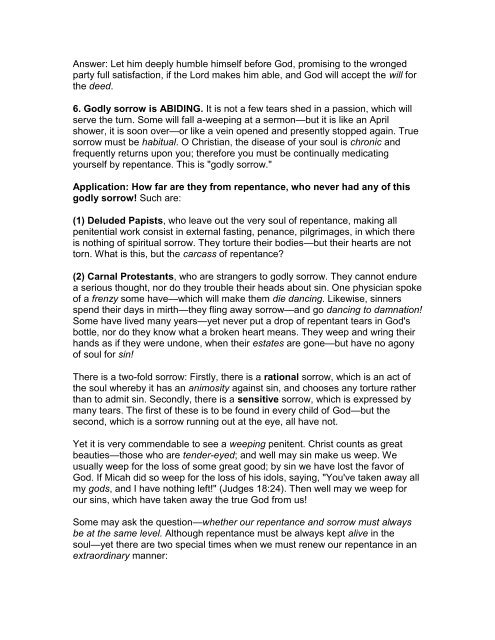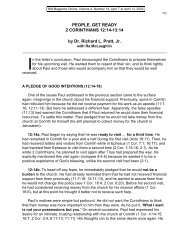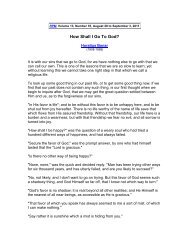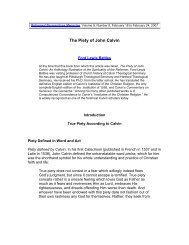The Doctrine of Repentance - Reformed Perspectives Magazine
The Doctrine of Repentance - Reformed Perspectives Magazine
The Doctrine of Repentance - Reformed Perspectives Magazine
Create successful ePaper yourself
Turn your PDF publications into a flip-book with our unique Google optimized e-Paper software.
Answer: Let him deeply humble himself before God, promising to the wronged<br />
party full satisfaction, if the Lord makes him able, and God will accept the will for<br />
the deed.<br />
6. Godly sorrow is ABIDING. It is not a few tears shed in a passion, which will<br />
serve the turn. Some will fall a-weeping at a sermon—but it is like an April<br />
shower, it is soon over—or like a vein opened and presently stopped again. True<br />
sorrow must be habitual. O Christian, the disease <strong>of</strong> your soul is chronic and<br />
frequently returns upon you; therefore you must be continually medicating<br />
yourself by repentance. This is "godly sorrow."<br />
Application: How far are they from repentance, who never had any <strong>of</strong> this<br />
godly sorrow! Such are:<br />
(1) Deluded Papists, who leave out the very soul <strong>of</strong> repentance, making all<br />
penitential work consist in external fasting, penance, pilgrimages, in which there<br />
is nothing <strong>of</strong> spiritual sorrow. <strong>The</strong>y torture their bodies—but their hearts are not<br />
torn. What is this, but the carcass <strong>of</strong> repentance?<br />
(2) Carnal Protestants, who are strangers to godly sorrow. <strong>The</strong>y cannot endure<br />
a serious thought, nor do they trouble their heads about sin. One physician spoke<br />
<strong>of</strong> a frenzy some have—which will make them die dancing. Likewise, sinners<br />
spend their days in mirth—they fling away sorrow—and go dancing to damnation!<br />
Some have lived many years—yet never put a drop <strong>of</strong> repentant tears in God's<br />
bottle, nor do they know what a broken heart means. <strong>The</strong>y weep and wring their<br />
hands as if they were undone, when their estates are gone—but have no agony<br />
<strong>of</strong> soul for sin!<br />
<strong>The</strong>re is a two-fold sorrow: Firstly, there is a rational sorrow, which is an act <strong>of</strong><br />
the soul whereby it has an animosity against sin, and chooses any torture rather<br />
than to admit sin. Secondly, there is a sensitive sorrow, which is expressed by<br />
many tears. <strong>The</strong> first <strong>of</strong> these is to be found in every child <strong>of</strong> God—but the<br />
second, which is a sorrow running out at the eye, all have not.<br />
Yet it is very commendable to see a weeping penitent. Christ counts as great<br />
beauties—those who are tender-eyed; and well may sin make us weep. We<br />
usually weep for the loss <strong>of</strong> some great good; by sin we have lost the favor <strong>of</strong><br />
God. If Micah did so weep for the loss <strong>of</strong> his idols, saying, "You've taken away all<br />
my gods, and I have nothing left!" (Judges 18:24). <strong>The</strong>n well may we weep for<br />
our sins, which have taken away the true God from us!<br />
Some may ask the question—whether our repentance and sorrow must always<br />
be at the same level. Although repentance must be always kept alive in the<br />
soul—yet there are two special times when we must renew our repentance in an<br />
extraordinary manner:







